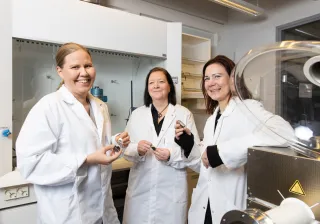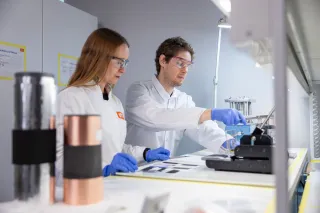It is undeniable that COVID-19 helped to accelerate the transition towards a digital economy. A process that would take a few decades, is now being established in a matter of months with remote work and education and e-commerce becoming the new norm. Including other impacts brought by the pandemics, it also led to an increase in COVID-19-related cybercrimes.
Overall, the increased deployment of digital technologies is disrupting business and bringing radical socio-economic changes. The manufacturing industry has been transformed with the usage of technological solutions, such as the internet of things, cloud technology, robotics and big data.
However, for the transition to be successful and the digital economy to flourish, a secure cyberspace is required. The higher the deployment of digital solutions in the industry or in the society, the higher the vulnerabilities created in the cyberspace.
Unfortunately, the unequal distribution of cybersecurity capacities across different parts of the world makes this goal of achieving a secure cyberspace quite challenging. Cybersecurity is not only a national but increasingly global issue.
The Ultimate Importance of Cybersecurity
Whereas developed countries have more advanced systems to curb cybercrimes, developing and emerging countries often lack both proper institutional apparatus and technical capacity to detect and combat cybercrimes, associated with proper levels of cybersecurity awareness throughout their societies.
These makes them vulnerable to attacks and to be used as launching grounds for worldwide cyberattacks, therefore cybersecurity becomes a major societal challenge for all countries and enhancing cybersecurity becomes a global collective-action problem.
It is so, that the former President of the European Commission, Jean-Claude Juncker stated, in the State of Union Address of 2017 that
“Cyber-attacks can be more dangerous to the stability of democracies and economies than guns and tanks. […] Cyber-attacks know no borders and no one is immune."
The European Union has been a leading investor and policy-maker in cybersecurity. It is aiming to invest €1.8 billion for cybersecurity, as part of its Digital Europe programme starting in 2021. It has also engaged in policy dialogues to strengthen cybersecurity capacities and preparedness with countries all over the world, as well as research projects such as those in the framework programmes FP7 and Horizon 2020 1.
As part of the European Commission funded project “YAKSHA” , together with companies and research institutes from Europe and Southeast Asia, VTT has implemented, among others, activities to favour the development of a cybersecurity innovation ecosystem in the Association of South-East Asian Nations (ASEAN), targeting particularly Malaysia, Thailand and Vietnam.
As the name suggests, cybersecurity innovation ecosystem refers to a network of innovation actors, including government, academia, industry and other types of economic actors, and society at large, aiming at promoting the development of cybersecurity capabilities within a national context and enabling the resilience and collaboration of the system in the international arena.
To build a strong cybersecurity innovation ecosystem in general, and in ASEAN society in particular, public and private sectors must work closely together. The interconnectivity of actors and actions is one of the central pillars of a cybersecurity innovation ecosystem.
The vulnerability and unpreparedness of a single actor can affect the entire ecosystem. Similarly, good practices and preparedness can have a positive impact and bring resilience for the whole ecosystem.
How to build strong cybersecurity ecosystems?
After conducting a series of workshops in Malaysia, Thailand and Vietnam with local cybersecurity stakeholders and project partners, our team of VTT researchers mapped the main challenges, gaps and needs related to cybersecurity in the three countries.
This information alongside local insights on what would be the ideal cybersecurity innovation ecosystem, based on a jointly-created vision, and action paths to achieve it, enabled us to create general recommendations for building strong cybersecurity innovation ecosystem in the region.
Based on the work implemented in ASEAN, to build strong cybersecurity innovation ecosystems it is important to 2 :
- Establish mechanisms for regulation and governance in cybersecurity
- Raise awareness and education about cybersecurity
- Develop a strategy to support business and innovation in cybersecurity
- Strengthen stakeholder dialogue to build up the cybersecurity innovation ecosystem to embed
- Strategic mapping of technologies and business to grow in strategic areas of national needs
Cybersecurity concerns all of us
In all, cybersecurity concerns not just research and development, actors within business and critical infrastructure, but the society at large. As users of digital devices, platforms and applications, cybersecurity concerns us all intensively. In Finland, Cyber weather reports provided by Traficom propose one example of making the phenomena’s characteristics more commonplace and understandable.
Concerning R&D capabilities, VTT has a solid background in solving cyber security challenges in several different industries, such as the energy and the telecommunications sectors.
VTT’s commercial Cyber War Room security laboratory and 5G pilot networks expedite tangible experiments and provide new information about the performance and security of innovations. Innovation and foresight studies complement the capabilities investigating the societal angle to the cybersecurity phenomena.
More fundamentally, cybersecurity is composed in VTT as a basic requirement for capability of future societies and organizations, similar to public health and health care.
1 YAKSHA (2018) D1.1 – ASEAN Cybersecurity Innovation Ecosystem: A Co-creation approach. Chapter 7.
2 YAKSHA (2018) D1.2 – ASEAN Cybersecurity Innovation Ecosystem: A Co-creation approach.







